#my daily contribution to society
Text
Obi-Wan: your need space-therapy!!
Cody: YOU NEED IT MORE.
Obi-Wan: you shot me off a cliff anf thought i was dead because of you!
Cody: YOUR BROTHER TRIED TO KILL YOU
Obi: Yeah, but-
Cody: and all your jedi friends died
Obi: yes, well-
Cody: you have no room to talk.
#star wars#commander cody#obi wan kenobi#post order 66#desert husbands#my daily contribution to society#codywan#cody x obi wan
256 notes
·
View notes
Text
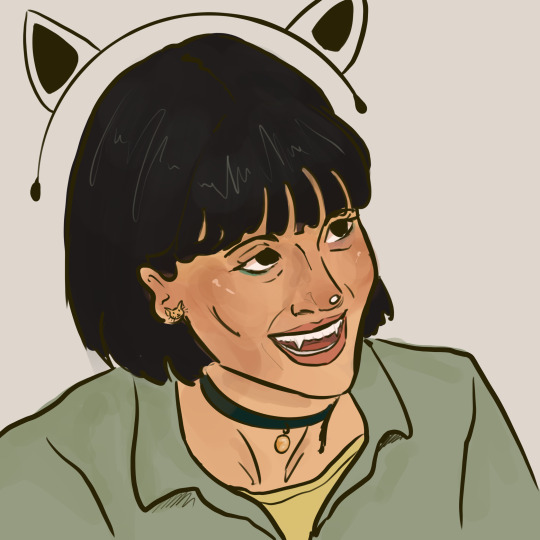
@cxsmic30 Verna with fangs, I hope this fit your image
#my daily contribution to society#Verna#tfothou#the fall of the house of usher#the fall of the house of usher fanart#art#fanart#digital art#verna tfothou#verna the fall of the house of usher
29 notes
·
View notes
Text
No thoughts, just Wanda at a goth club.
#଼⠀ ݁⠀✴︎〝 𝐖𝐄'𝐑𝐄 𝐇𝐄𝐑𝐄 𝐅𝐎𝐑 𝐓𝐇𝐄 𝐂𝐔𝐋𝐓 𝐒𝐓𝐔𝐅𝐅! 𝐖𝐄 𝐒𝐀𝐖 𝐓𝐇𝐄 𝐀𝐃 𝐎𝐍 𝐂𝐑𝐀𝐈𝐆𝐒𝐋𝐈𝐒𝐓! ¦ 𝘰𝘰𝘤.#଼⠀ ݁⠀✴︎〝 𝐃𝐎𝐖𝐍𝐒 𝐎𝐍 𝐄𝐌𝐏𝐓𝐘 ¦ mobile.#(my daily contribution to society lol.)#(but who will go with her is the question. 😏)
7 notes
·
View notes
Note
Okay. Imagine. A demon slayer reader x Mizu. Bruh. She out her with a long line of family that has killed demons all across Japan and they send the reader out with wisteria and mask and a very special katana to keep demons away or to kill them. Only to meet Mizu and find her beautiful and want her to teach them how to become a samurai. Tagging along on her travels for revenge completely content with just following her and helping her out. Not thinking she is a demon at all.
Thank you that’s all.
In a society that is deeply xenophobic and alienating, Mizu is so traumatized by her upbringing and experiences as to believe that she is a demon. Societal pressures, prejudices, and superstition, as well as deeply rooted self hatred have all contributed to the belief. This belief is so consistently reaffirmed in her daily life as an outcast to normality, that it's all but a truth to her.
Then comes Demon Slayer!reader. Someone who takes genuine interest in her and builds trust through their constant presence. Someone who Mizu can admit has an incredible set of skills and unmatched swordsmanship. Someone she comes to deeply respect, and to love.
In loving you, she doesn't wish to deceive you. She holds onto a dangerous hope that somehow, just this once, the person she cares for won't turn their back when faced with the ugly truth. She timidly asks you one night, eyes betraying some fraction of her anxiety, "Would you stay by my side if I were a demon?"
And you laugh, which does nothing to soothe her nerves. "You're not a demon. I'll never have to face that choice."
She scoffs. "Right."
You set aside your cup of tea and attempt eye contact, but she sadly stares into the bonfire. "Is that what you believe," you whisper, "that you're a demon?"
She nods, her expression a mixture of shame, anger, desperation. "I know I am. I'm an onni."
And she cares for you so deeply that she's about ready to apologize for deceiving you. But you're voice is filled with a determination she's never witnessed when you reply, "I come from generations of demon slaying. I have dedicated nearly every second of my life to tracking, hunting, and killing demons. Do you think you could have possibly deceived me all this time? Do you trust so little in my expertise that you think a demon could have fooled me for so long?"
She lifts her eyes to look at you, unsure of where you're headed.
"You are not a demon, Mizu. You aren't even close, and with me around, you never will be. I won't let you become one. However," your voice softens, your hand covering hers, "If it turned out that I was truly a fool, and that all of Japan and yourself were correct and you were a demon, I would still love you. You could have been a woman, a man, a breeze in the trees, or a storm approaching the shore, and I would have loved you anyway."
#mizu#mizu x reader#blue eye samurai#blue eye samurai netflix#mizu blue eye samurai#blue eye samurai x reader#demon slayer#taigen#akemi#akemi x reader#blue eye samurai mizu#blue eye samurai fanart
446 notes
·
View notes
Text
Kwanzaa:
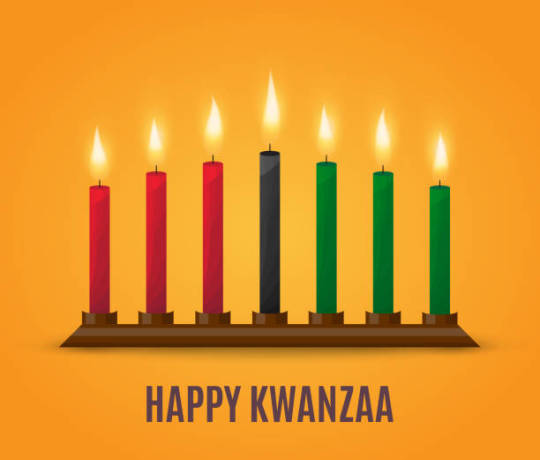
Kwanzaa, an annual holiday celebrated primarily in the United States from December 26 to January 1, emphasizes the importance of pan-African family and social values. It was devised in 1966 by Maulana Karenga, Inspired by Africa’s harvest celebrations, he decided to develop a nonreligious holiday that would stress the importance of family and community while giving African Americans an opportunity to explore their African identities. Kwanzaa arose from the black nationalist movement of the 1960s and was created to help African Americans reconnect with their African cultural and historical heritage. The holiday honors African American people, their struggles in the United States, their heritage, and their culture. Kwanzaa's practices and symbolism are deeply rooted in African traditions and emphasize community, family, and cultural pride. It's a time for reflection, celebration, and the nurturing of cultural identity within the African American community.
Kwanzaa is a blend of various African cultures, reflecting the experience of many African Americans who cannot trace their exact origins; thus, it is not specific to any one African culture or region. The inclusiveness of Kwanzaa allows for a broader celebration of African heritage and identity.
Karenga created Kwanzaa during the aftermath of the Watts riots as a non-Christian, specifically African-American, holiday. His goal was to give black people an alternative to Christmas and an opportunity to celebrate themselves and their history, rather than imitating the practices of the dominant society. The name Kwanzaa derives from the Swahili phrase "matunda ya kwanza," meaning "first fruits," and is based on African harvest festival traditions from various parts of West and Southeast Africa. The holiday was first celebrated in 1966.
Each day of Kwanzaa is dedicated to one of the seven principles (Nguzo Saba), which are central values of African culture that contribute to building and reinforcing community among African Americans. These principles include Umoja (Unity), Kujichagulia (Self-Determination), Ujima (Collective Work and Responsibility), Ujamaa (Cooperative Economics), Nia (Purpose), Kuumba (Creativity), and Imani (Faith). Each family celebrates Kwanzaa in its own way, but Celebrations often include songs, dances, African drums, storytelling, poetry readings, and a large traditional meal. The holiday concludes with a communal feast called Karamu, usually held on the sixth day.
Kwanzaa is more than just a celebration; it's a spiritual journey to heal, explore, and learn from African heritage. The holiday emphasizes the importance of community and the role of children, who are considered seed bearers of cultural values and practices for the next generation. Kwanzaa is not just a holiday; it's a period of introspection and celebration of African-American identity and culture, allowing for a deeper understanding and appreciation of ancestral roots. This celebration is a testament to the resilience and enduring spirit of the African-American community.
"Kwanzaa," Encyclopaedia Britannica, last modified December 23, 2023, https://www.britannica.com/topic/Kwanzaa.
"Kwanzaa - Meaning, Candles & Principles," HISTORY, accessed December 25, 2023, https://www.history.com/topics/holidays/kwanzaa-history.
"Kwanzaa," Wikipedia, last modified December 25, 2023, https://en.wikipedia.org/wiki/Kwanzaa.
"Kwanzaa," National Museum of African American History and Culture, accessed December 25, 2023, https://nmaahc.si.edu/explore/stories/kwanzaa.
"The First Kwanzaa," HISTORY.com, accessed December 25, 2023, https://www.history.com/this-day-in-history/the-first-kwanzaa.
My Daily Kwanzaa, blog, accessed December 25, 2023, https://mydailykwanzaa.wordpress.com.
Maulana Karenga, Kwanzaa: A Celebration of Family, Community and Culture (Los Angeles, CA: University of Sankore Press, 1998), ISBN 0-943412-21-8.
"Kente Cloth," African Journey, Project Exploration, accessed December 25, 2023, https://projectexploration.org.
Expert Village, "Kwanzaa Traditions & Customs: Kwanzaa Symbols," YouTube video, accessed December 25, 2023, [Link to the specific YouTube video]. (Note: The exact URL for the YouTube video is needed for a complete citation).
"Official Kwanzaa Website," accessed December 25, 2023, https://www.officialkwanzaawebsite.org/index.html.
Michelle, Lavanda. "Let's Talk Kwanzaa: Unwrapping the Good Vibes." Lavanda Michelle, December 13, 2023. https://lavandamichelle.com/2023/12/13/lets-talk-kwanzaa-unwrapping-the-good-vibes/.
298 notes
·
View notes
Text
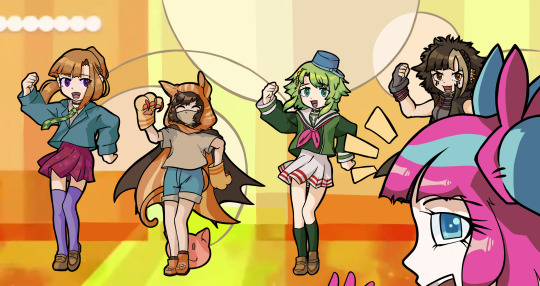
Day 122: HAPPY OUT OF TOUCH THURSDAY EVERYONE
Got the whole memory dance squad together ^^ (yes, these four are what I’ve been working on all week, sorry abt the shit background)
Plus, exciting bonus: the shop is now open! You can now get these four (and partriodge ranger) as stickers if you’d like! I’m gonna make sure to have at least one new out of touch character every out of touch Thursday bc;
1. there’s not enough yttd merch out there so I gotta contribute to society somehow and
2. I wanna make sure that everyone can have a lineup of all their favs ^^
Keep in mind that I’m not doing this for any real profit, I just wanna see people happy with the stuff I make; so please let me know if there’s anything you’d like me to make! Doesn’t have to be sticker, teki or out of touch Thursday related, any art request is fine! If you’d like me to make a proper shoplift shoplaugh shoplove Midori poster I can totally do stuff like that too :>
I’ll make sure to keep doing my dailies tho lmao, I just had a bunch of stuff on last week
+ a Teki-less dance squad if you’d like that for background reasons or anything :>

#sorry there’s so much text lmao I tried to shorten it as much as I could but it is. important to me#if you’d like alterations or existing art on other things lmk about that too ofc ^^#your turn to die#yttd#daily teki#out of touch thursday#sara chidouin#gin ibushi#kanna kizuchi#reko yabusame#teki tsutone#yttd memory dance girl#yttd daily#yttd dailies#teki yttd#yttd art#your turn to die art#yttd merch#yttd fanart
203 notes
·
View notes
Note
How can I use astrology to find an ideal career for me?

Astrology and Career: Discover Your Cosmic Sea to Success

Navigation: Masterlist✦Ask Rules✦Feedback Tips
Askbox✦Sources✦Paid Readings

career [ kuh-reer ] noun
an occupation or profession, especially one requiring special training, followed as one's lifework:
a person's progress or general course of action through life or through a phase of life, as in some profession or undertaking
We have several details to talk about how astrology can help us find our ideal profession and we use what we have in our power to strengthen ourselves and self-knowledge.

Planets
Career as we saw earlier is not just work and your job, it encompasses many things in your life as it is something that takes many years, so all planets show something related to your career.
Sun: The radiant center of our being, revealing our mission, identity, and values. It guides us towards the areas where we seek recognition and how we can contribute to society.
Moon: Reflecting our emotional desires and commitments, the Moon unveils our preferences for a comfortable and nurturing work environment.
Mercury: The realm of analytical skills and communication, Mercury highlights areas where our rational thinking aids and supports us, making tasks easier and efficient.
Venus: Governing our ability to forge relationships and be adored, Venus unveils our potential to sell products or ideas, how others perceive us, and how we can add value.
Mars: The driving force behind our desires and motivations, Mars indicates where we can find energy, passion, and determination to propel us forward.
Ascendant: The extra personal talent, exclusive to each individual, offers a distinct insight into your inherent abilities and potential.

Elements and Modalities
It can be used for each planet (it won't be so detailed, if you want me to talk about each one, like or reblog to show that you are interested in the subject...), but it is used to see the dominant modality and element in the natal chart.
Earth: Seeking security and practicality, Earth signs are adept at managing and structuring tasks, valuing their products and presenting their true worth.
Water: Emotionally driven, Water signs thrive in environments that foster connection and love, often leading to careers where care and bonding are vital.
Air: Driven by intellectual pursuits and interaction with people, Air signs flourish in professions that require intelligence and daily engagement of their diverse skills.
Fire: The passion and drive of Fire signs lead them towards pioneering roles and highly recognized positions, necessitating dynamic and energetic environments.
Cardinal: Initiators and independent spirits, Cardinal signs embrace challenges and take the lead in manifesting their intentions.
Fixed: Penchant for control and security, Fixed signs passionately pursue their interests and maintain unwavering dedication.
Mutable: Embracing change and creativity, Mutable signs excel in professions that allow flexibility and unconventional approaches.
Now... I know that you want career paths you can work on, but I first showed you how you can understand what are your needs and strengths before giving professions because I think it's more important for you to know your needs than to think "wow, look, my natal chart tells me to be a doctor, I think I'll drop everything to do medicine"

How to know if you do well in this career??
1º Way: Identify the ruling planets of the earth houses: 2nd (work and money), 6th (job and routine), and 10th (career) house. Then, determine which house the ruling planet of this house is in. Next, refer to the list below and check if there's a career you like associated with that house. For example, my 2nd ruling planet is in Taurus, and my Venus is in the 5th. Therefore, I'll explore professions related to LEO/FIFTH HOUSE.
2º Way: Identify the career sign you are most interested in. Find the ruling planet of that sign and see if it corresponds to the 2nd,6th or 10th in your birth chart. For instance, I'm interested in reading tarot cards, so I'll check the position of my Pluto (ruler of the 8th). As it's in my 10th, tarot card reading could be a good career choice for me.
3º Way: Identify the planets that fall in your 2nd, 6th and 10th houses and see directly the professions it represents, knowing that in terms of CAREER, the 10th house is more important. So if I have no planets in the 2nd, Venus in the 6th and none in the 10th, I see the carrers that are represented by Venus.

Signs/Houses
ARIES / FIRST HOUSE- athletics, entrepreneurship, leadership, military, police, firefighter, lifeguards, surgeries, creating something, competitive careers …
TAURUS/ SECOND HOUSE - Plastic arts, dressing rooms, painting, things related to food, finance, massage therapy and well-being, services that involve giving a pleasant experience to others, aesthetics.
GEMINI / THIRD HOUSE - writing, journalism, communication, teaching, advertising, libraries, representatives, assistance, performance, things related to organization, information management, research …
CANCER / FOURTH HOUSE - medicine, nursing, veterinary, work that involves taking care of the home and decoration, so also architecture, work that involves taking care of things, restoration, photography, painting, music, art, crafts, accommodation, doula, public offices , trade in household items, babysitting and professions that involve taking care of children, providing services to people in situations of vulnerability, first sector...
LEO/ FIFTH HOUSE- Leader, work related to the government, work related to money and luxury items, work related to leisure and hospitality, entrepreneurship, social networks, presenters of all media, blogs, theater, dance, music, arts in general , directors of artistic projects, cinema, events, fashion, design …
VIRGO / SIXTH HOUSE - Personal organizer (it is the most virgo job in the world), assistance to someone virtual or in person, secretary, work related to organization and analysis, work related to health such as nursing, medicine, pharmacy, work related to mathematics and to money like accounting, librarian, writing, therapy, informatics …
LIBRA / SEVENTH HOUSE - Advocacy, justice, diplomacy, arts, aesthetics, fashion, architecture focused on decoration and beauty, sales, high quality and refined products, design, work related to people …
SCORPIO / EIGHT HOUSE - psychiatry, medicine, psychology, police, military, research, astrology, works related to people who died as gravediggers and doctors who do autopsy, spirituality and the occult, coach, investments, administration, politics, research in any field. ..
SAGITTARIUS / NINTH HOUSE - Politics, justice, diplomacy, tourism, religion, teaching a higher education course, teaching wisdom, philosophers, careers related to foreign countries, foreign trade, sports, careers involving recreational activities, careers with more playful areas such as theater, dance and circus, astrology.
CAPRICORN / TENTH HOUSE - Management and entrepreneurship, CEO, engineering and areas that use mathematics, construction, land-related jobs and projects for places or businesses, management, jobs that involve preparing something like a director developing a play or a project , producers. . .
AQUARIUS / ELEVENTH HOUSE - Science, astrology, everything related to technology, information technology, social media, TV and radio, politics, social projects, social sciences, social causes and social assistance (very social this sign), projects humanitarian and altruistic, demonstration and mobilization of people, jobs that aim to revolutionize and change society and the way people live their lives …
PISCES/ TWELVE HOUSE - Psychology, music, theater, crafts, spirituality, therapy, holistic therapy, careers that involve helping others and social causes, work related to hospitals, nursing and caring for others, jobs that help people who have some kind of neurological imbalance or older people or who are on the margins of society in some way.

Planets
Sun: The Sun empowers individuals to take on leadership roles and excel in careers related to the government, money, luxury items, leisure, and hospitality industries. The Sun's radiant energy blesses entrepreneurs, social network influencers, media presenters, bloggers, artists in various forms (theater, dance, music, and arts), directors of artistic projects, cinema, events, and professionals in fashion and design.
Moon: The nurturing influence of Moon shines upon careers in medicine, nursing, veterinary, nutrition, and professions involving home care, decoration, and architecture. Lua's caring nature extends to jobs that involve restoration, photography, painting, music, art, crafts, hosting, doula work, public office, commerce of household goods, nannies, and roles providing services to vulnerable individuals, especially in the first sector, as well as culinary arts and cooking.
Mercury: The intellectual prowess of Mercury guides individuals towards careers in information technology, writing, journalism, communication, teaching, advertising, libraries, and as representatives. Mercury's sharp mind is well-suited for roles as personal organizers, virtual or face-to-face assistants, secretaries, and professionals in the pharmacy sector. Additionally, Mercury's association with mathematics and money makes it relevant in accounting, librarianship, writing, and computing.
Venus: The artistic and harmonious energy of Venus blesses individuals in careers related to plastic arts, fitting rooms, painting, and the culinary arts. Venus finds fulfillment in professions associated with food, finance, massage therapy, well-being, aesthetics, law, justice, diplomacy, fashion, and architecture focused on decoration and beauty. Venus also thrives in sales, dealing with high-quality products, design, and people-related work.
Mars: The bold and assertive influence of Mars directs individuals towards careers in athletics, entrepreneurship, leadership, military, police, firefighting, lifeguarding, surgery, and any field that requires competitive spirit and a drive to create something remarkable. Mars also finds expression in careers related to medicine.
Jupiter: Jupiter's expansive and benevolent energy inspires careers in politics, justice, diplomacy, tourism, religion, higher education, teaching wisdom, and philosophy. Jupiter's connection to foreign trade and astrology adds depth to careers related to these fields.
Saturn: The disciplined and structured influence of Saturn leads individuals towards careers in administration, entrepreneurship, CEO positions, engineering, and areas that involve mathematics. Saturn's expertise in construction and project management makes it valuable in various roles, including those of directors and producers.
Uranus: The innovative and revolutionary spirit of Uranus shines upon careers in science, technology, social media, politics, NGOs, social projects, and humanitarian efforts. Uranus is also influential in social sciences, social causes, and careers that involve social assistance, aiming to transform and uplift society.
Neptune: Neptune's compassionate and spiritual essence guides individuals towards careers in psychology, music, theater, crafts, spirituality, therapy, and holistic therapy. Neptune finds fulfillment in professions that involve helping others and social causes, particularly in healthcare settings. Jobs linked to hospitals, nursing, and care for others resonate with Neptune's healing energy.
Pluto: The transformative and powerful influence of Pluto leads individuals towards careers in psychiatry, medicine, psychology, investigation, astrology, spirituality, occultism, coaching, investment, administration, politics, and scientific research. Pluto's connection to matters of life and death makes it relevant in fields such as gravedigging and forensic medicine, while its association with transformation and marketing adds depth to careers in the marketing industry.

Julia's Special Note
I enjoy helping people, so let me share a unique insight that you won't find anywhere else. Jupiter and Saturn play significant roles in determining our value in both personal and societal contexts. Jupiter represents the value that society places on us, while Saturn signifies the value we place on ourselves in relation to society. In short, these two planets can reveal insights into your salary and financial gains in your profession.
The key aspect here is their conjunction. For many years, Jupiter and Saturn have been meeting in earth signs, indicating a strong emphasis on material values, productivity, and tangible outcomes. This means that society has highly valued material success, productivity, and practical skills.
However, over the next 200 years, they will conjoin in air signs, signaling a shift in societal values. The focus will move towards knowledge, expertise, teaching abilities, effective communication, and the dissemination of information. In this new era, what garners a good salary today may no longer hold the same value in 200 years. Thus, it won't matter so much what profession you have, but rather, the greatest differentiating factor for achieving good financial gains will be how much you know and specialize in your chosen field, rather than just how much you produce.
(CC) AstroJulia Some Rights Reserved

#astrojulia#astrology#witchblr#astroblr#all about astrology#astro community#astro observations#astrology notes#witch community#astrology community#career#2nd house#6th house#10th house#sun#moon#mercury#venus#mars#jupiter#saturn#neptune#uranus#pluto#natal chart#birth chart#astrology basics
425 notes
·
View notes
Text
Tal Mitnick, an 18 years old Israeli that refused to serve in the military:
It's not just a couple of soldiers that are bad soldiers or that enact violent occupation on Palestinians, it's actually a whole system of violence. Of pulling people into the army and making them work for the occupation and for oppressing Palestinians.
Militarism in Israel is very entrenched in society. And the military is some golden goose that you're not allowed to touch. You're allowed to criticize the government, you're allowed to go out for gay rights, for women's rights. But when it comes to criticizing military action against Palestinians or other oppressed communities, this is totally out of the norm. You cannot speak against the military because it's so entrenched in society.
A lot of conversations start with the military, and because most people did serve, it's seen as this kind of thing that everyone needs to pass in order to become an Israeli.
So. Yeah. When you're older you don't feel ostracized as much because after a while it's less relevant to daily life. At least in my experience, I didn't serve and it's not really talked about much at this point.
In Jewish Israeli society, the military is trusted more than most other institutions. Tbh, more than any other institution I can think of. And it's seen as a right of passage. Some people will be okay with you if you volunteer for a social service instead - work at hospitals, schools, etc. Others think you shouldn't get the choice, and unless there's a medical issue you should be going to the military.
The narrative of self defense is absolutely believed, so by refusing to serve, those kids are seen as saying "I will enjoy the sacrifice made by others, but I will not contribute myself." It's seen as ungrateful. But that's if you don't express a moral objection to the military.
If you challenge the military itself, you're challenging Israeli society. And that's how it's taken. "I refuse to participate in the occupation" - "So you're saying I did something bad by serving. You're saying I'm a bad person." And when most of Israelis served in the military, and those that didn't serve often still support it or have loved ones that did or still do, this is challenging the moral character of pretty much all of us. Which, it should.
The military nurtures a mindset of dehumanization to a scary degree. I listened to a few interviews with stories from Breaking the Silence, an organization meant to bring to light the way the military abuses Palestinians, and there's something described by Yehuda Shaul.
He tells the story of serving in Hebron, in the West Bank, and he describes the daily stated mission of soldiers there.
While on patrol at night, they pick a random Palestinian house - explicitly one that they have no intelligence against, a civilian family - and they get in, wake the family up, separate men from women, search or something, get on the roof, jump to the next roof, get into that house, wake that family up, treat them the same way.
Again, at random. And he described two goals for this:
One, to create the feeling of being persecuted, and two, to make our presence felt.
They want Palestinians to feel beaten down and powerless, and they want them to feel that the military is everywhere, so they're too scared to resist.
This isn't random rogue soldiers, this is what the military does there on a normal day. And he said it's impossible to treat a population this way without seeing them as less human than we are.
I don't know if I can just say that the military is another tool for indoctrination in addition to everything else it does. But as a kid, I had a left-leaning friend from the Tel Aviv area, and we'd argue a lot. Because you don't need to be a full on leftist to disagree very strongly with a teenage settler. And as I was going through the process of changing my mind, I saw him going through the same process in the opposite direction - he became way more right wing during his military service. He told me the stories of why, and all those stories did was make me feel like I don't even know this person. I wonder sometimes how many young people go through the same.
189 notes
·
View notes
Text
Be My Favorite, I have something important to tell you.
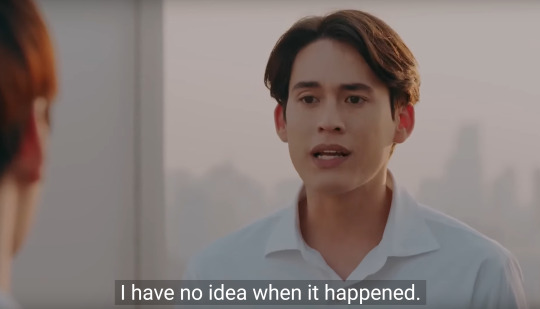

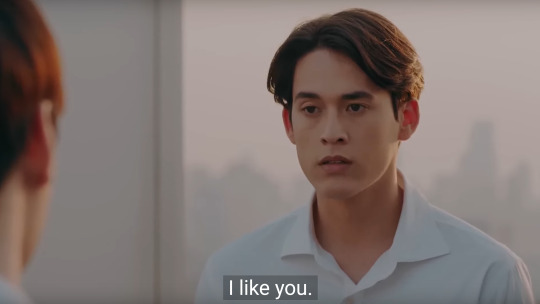
Seriously. Was it episode four that did it? Episode two? EPISODE ONE?! Or was it even earlier than that? I thought about you daily for a year and a half before you even premiered, so have I loved you all along? I DIDN'T EVEN MUTE THE SINGING! I knew as soon as Kawi was looking for a talent what the outcome would be BUT I DIDN'T PUSH MUTE!
I'm in too deep. I can't stop these feelings now. Not when you gave me this scene at the beginning of the episode where Pisaeng tells Kawi he will be honest about his feelings, and Kawi, looking so small, knows exactly what he is talking about.

Or when you gave me this ENTIRE journey of Pisaeng seeing two men kiss with the multi-colored lighting, and the multi-colored neon sign asking him to evaluate his emotions, and the safe space he lands in front of!




Only to have Pisaeng run away, but return in BROWN. I have a theory that Pear is peach/pink, Pisaeng is black, and Kawi is brown, so Pisaeng going back in the color of the boy who awakened these feelings in him . . . *opens up pint of ice cream and bottle of wine*

Then the fear Pisaeng had running into Max while the song in the background sang, "I'm not afraid to love"

But Piseang showing up the next day (with the closed sign sooooo appropriately placed on his body)

Because Max is the perfect friend even when he doesn't want to be. He told Kawi that everyone treats Kawi with kindness while he is kind of a dick to people, and even though he snapped at Pisaeng for thinking the world revolves around him and his issues, he course-corrected and offered a kind ear to him.

Max presents this character who is visibly queer, and to tell a straight-passing privileged boy that queerness is not a destination or a place, but an answer within ourselves is powerful. Max doesn't have to be kind to Pisaeng, but he is gentle because he realizes the struggle of being judged by appearances.

Max states that he was wrong to judge Pisaeng by his cover, and we got several books in this episode which all showed depths to the characters:
Pear had Behind the Painting - Siburapha's famous work about an arranged marriage, forbidden love, social injustice, and inequality.
Pear also has Ujjeni's book of poems The Golden Horizon, which many of the poems encourage people to keep faith against injustices and to live with an open heart.
Not of all people wrote a book that deals with love.
Kawi has 1984, a story about a society who is constantly monitored by an oppressive government and the way the protagonist actively contributes to its control by rewriting the past.
And I think Max is reading a book about gardening or cooking, but I'm unsure.





But this all leads to the overall point of this episode - Kawi's evolution. Magic won't help him find the answer. He won't find his answer in a destination or a place. The answer to how to improve his life is within him and has always been. Kawi is quick to judge everyone else, yet thinks he was unfairly judged, but the more he matures, the more he will realize HE contributed to his current situation.

Pisaeng was bothered by Not laughing when Kawi sang (he looked over at Not several times). Pisaeng invited Kawi out after their freshmen interviews, but Kawi dismissed him.


Kawi hasn't been kind. Period. He hasn't been kind to himself nor to others. Pisaeng rejected Pear with kindness. Pear rejected Kawi with kindness. But Kawi avoided Max in the past and Pisaeng because of . . . their queerness? What that would imply about him? There are several answers, but he never treated them with kindness. Not is slowly learning this lesson as well. Everyone hates his book, but the second he is shown kindness, he sends it Kawi's way.
Because the point of all of this is that magic doesn't heal people.
Kindness does.

Random sidenotes because I can't be crying in the club: I'm obsessed with this woman and her big black eyes.

And Be My Favorite hasn't faked us out once so far with these previews, so . . .

*pushes play on Fluke Gawin's OST "Unable" while I think about Kawi looking at Pisaeng at practice as he sings about the other person unexpectedly changing his life because I'm UNABLE TO STOP LOVING THIS FUCKING SHOW NOW!*
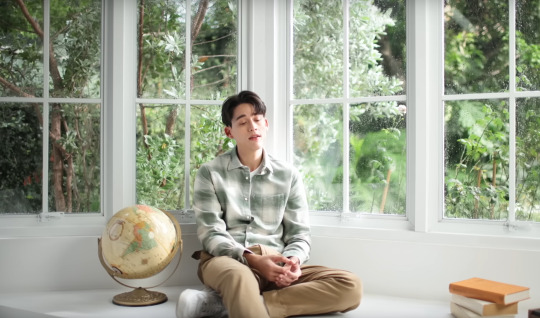
#I'm in deep#this is going to be a top for me if it keeps this up#Be My Favorite#It is my favorite!#be my favorite the series#episode 5#pisaeng x kawi#How can I love this show so much?!#When did it start?#Have I loved it forever?#This is like my bisexual awakening all over again!#I knew the feelings were there but now that they are out I can't go back
326 notes
·
View notes
Note
Can you make a fic with miguel and deaf reader? I would love to read the scenario you come up with
OH MY GOD YES!!! IM SO HAPPY YOU ASKED ME THIS <33
🤍🤍🤍🤍🤍🤍🤍🤍🤍🤍🤍🤍🤍🤍🤍🤍
you taught him a few signs here and there to communicate with miguel, your boyfriend. he was very open-minded and was willing to learn to communicate with you. he was happy to learn sign language just for you. on his free time miguel took it upon himself to learn sign language depending on your language—american sign language. you even came up with his name sign which was unique to him and him only. he even gave you a name sign as he asked for your permission that would be something simple and sweet.
he took the time to educate himself on deaf culture and get well in tune with your needs. your relationship is filled with tender moments. miguel expresses his love and affection through gentle touches, warm embraces, and affectionate gestures. he values the power of nonverbal communication, using body language and subtle cues to convey his emotions and desires to you
you, in turn, appreciates miguel’s dedication and effort to learn sign language. you also contribute to the relationship by helping miguel improve his communication skills. together, miguel finds joy in practicing sign language, engaging in playful conversations, and sharing your thoughts and feelings through this unique form of communication. miguel would feel at ease not needing to speak up and feel as if he could express himself more better through signs. miguel loves loves to take you on dates or going on late night walks where you both can unwind together. usually, miguel loves to stop by your room. you both like to spend together watching movies, cuddling, while miguel hands you snacks and drinks he brings.
“you’re so beautiful.” miguel mouths in a whisper tone while he signs in which you smile warmly at him and sign back to him, “thank you, my love, you’re so handsome too.”
in the daily life, miguel ensures that you have access to any necessary accommodations, making sure your environment is inclusive and supportive. he advocates for your needs, whether it's in social situations, work environments, or public spaces, ensuring that you can thrive and fully participate in the spider society. miguel always makes you feel accepted and included in everything. miguel makes it his goal through physical touch and acts of service that he loves and cares about you deeply. you can’t thank him enough for being the best boyfriend ever and being such a supportive person.
��——
a/n: this was so cute to write 😵💫🩷
tags 🏷️: @kairiscorner
#spiderman atsv#spider man: across the spider verse#miguel o'hara#miguel o’hara x reader#atsv x reader#miguel spiderman#spider person#miguel o’hara x y/n#spidersona#ao3 works#miguel o’hara x deaf!reader#🌱 lin writes#deaf!reader#atsv miguel#atsv#miguel x reader
129 notes
·
View notes
Text




My mom bought me these boots from Zara in Denver a few weeks back. She could feel me sinking into a pit of rage, grief, and hopelessness. So, she came to meet me in Denver and upon landing, took me to walk the mall “just to get out and move through it.” My mother, a miracle, born to a father who was the sole Holocaust survivor in his family, knows a thing or two about battling anger and grief at a world fixated on annihilating Jews and our spirits.
I've been intimately familiar with the horrors of October 7th since it happened. Like countless Jews, I've meticulously followed every gruesome detail of Hamas' well-planned and well-funded genocide attempt. Every despicable act of torture, rape, and murder – etched into my bones. On top of that, I follow daily the relentless onslaught of people and communities celebrating, erasing, and justifying the slaughter, while denying our right to defend ourselves. Watching old friends ‘like’ and share posts constantly which dehumanize Jews and lie about Israel, putting our lives further at risk. Contending with all of this over the past few months has been unbearable. Like many Jews, I'm haunted both awake and asleep.
I've been debilitated, struggling to cope with all of it. How do we carry on in a country where so many wish us dead? How do we thrive in a place that dismisses our pain and disregards our countless contributions to society? How do I contemplate having children in a place where their lives aren't valued? How can I coexist with so many people who, at best, couldn't care less about the brutal murders of over 1200, the kidnapping and daily ongoing torture of hundreds more for over 119 days, while the world cheers for the rest of us to be annihilated? How do I sleep at night when all I can think about are the looming threats to Israel and the Jewish people, the treatment of our hostages, and the insidious web of hatred that constantly engulfs our existence?
When my mom handed me these boots, I thought they might be fitting for Israel, but I didn't really dwell on it. I knew the journey would be grueling. And while I thought I already knew the gruesome details, walking through the aftermath is a different level of knowing. These boots tread through miles of hell – the remnants of homes ruthlessly attacked by a kind of evil I couldn't fathom existed. An evil that deliberately targeted communities of Israelis dedicated to peace, only to be met with beheadings, rape, burning alive, and slaughter.
These boots tread through miles of desolation – the aftermath of thousands of terrorists and hundreds of so-called "civilians" perpetrating unspeakable acts against over a thousand innocent, peace-loving people. These vile rapists and murderers were the beneficiaries for years of those they heartlessly slaughtered. They were acquainted with so many of these good people, the very people they mercilessly killed. Several of these compassionate Israelis had welcomed these terrorists into their homes for years, offered them work opportunities, and tirelessly tried to help them lead a better life.
These boots ventured through charred remains, blood-soaked grounds, and homes, bomb shelters, and once-beloved personal spaces and belongings torn apart, covered in bullet holes, reduced to pieces and char – all obliterated by hours of relentless assaults by terrorists armed with thousands of machine guns, fire bombs, and RPGs. Weapons funded, in part, by American and European taxpayers, whose leaders for years knowingly funneled billions into a terror operation whose sole objective is eradicating Israel and every Jew from the map before extending their genocidal ambitions westward.
After coming back from our third trip to the massacre sites in the south,
@JordynTilchen
insisted on me wiping these boots down before stepping into our rental, but the weight of what they carried was too immense. I couldn't erase the traces of blood and death that clung to them. Instead, I brought them home with me wrapped in several bags. These boots hold more than just grime; they carry the echoes of unspeakable atrocities and the silent cries of hundreds and hundreds of innocent lives ruthlessly tortured and taken.
I've decided to give them a burial here, to acknowledge the horrors they tread through, the shattered communities and homes they traversed, and to honor the remains of the once-beautiful lives torn from existence that cling to them. As I do this, I promise to honor not only those brutally murdered and taken hostage, but also those who are risking everything to defend the rest of us. I promise to continue to do my best to not be consumed by what feels like a tsunami of hopelessness, but to pick myself back up and channel this endless grief and anger into meaningful action and resilience.
Eden Cohen ✡︎ עדן כהן
@edencohentweets
#Israel#October7#Hamas Massacre#Operation Sword of Iron#HamasislSIS#BringThemHomeNow#BringThemAllHomeNow#HamasKidnappers
53 notes
·
View notes
Text
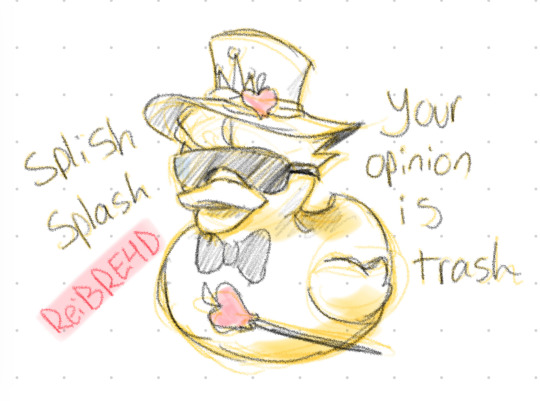
and that is my daily contribution to society, thank you for joining me
(will probably end up being a sticker eventually👹)
i am still working on that legged pentious btw- i finished the lineart finally so im almost done heheh >:)
#fanart#lucifer hazbin hotel#hazbin hotel#art#digital art#hazbin#lucifer hazbin#hazbin lucifer#hazbin hotel lucifer#meme#rkgk#doodle#sketch
32 notes
·
View notes
Text
Dug up a very old paper I wrote almost 6 years ago titled "Tianyuan Feminism and Women in Contemporary China," putting it here if anyone's interested in reading this verbose thing:
Zhonghua tianyuan nüquan, which literally translates to “Chinese rural feminism,” is a term that became popular on the Chinese internet in recent years. It should be noted that the phrase nüquan, meaning “feminism,” is used ironically and negatively within the term, as the zhonghua tianyuan nüquan represents a set of beliefs contrary to feminist ideals. Also, zhonghua tianyuan, meaning “Chinese rural,” does not indicate the rural areas of China, but as is generally agreed by Internet users, refers to a breed of domestic dogs indigenous to China. Therefore, “Chinese rural” really signifies the indigeneity of the concept. The phrase tianyuan, which means “rural,” can also refer to an idyllic countryside far from the scenes of buzzling life, and its implication of utopian impracticality leads to some people’s interpretation of tianyuan as “empty talk with no practical results” (Du, “A Reinless Wild Horse in the Age of New Media”). For the sake of brevity, I will refer to zhonghua tianyuan nüquan as “tianyuan feminism” in my following analysis. I will discuss the meaning of tianyuan feminism, its indigeneity, the possible reasons for the rise of such phenomenon, and people’s usages of and responses to the term.
What is tianyuan feminism?
In a discussion board titled “what’s the definition of tianyuan feminism?” on Zhihu, one of the most popular online forums in China, a top comment that received over eight hundred likes defines tianyuan feminism as thus:
Tianyuan feminism is a freak born of the hybrid of the remnants of Chinese feudalism and Western consciousness of individual rights. These women have no idea what feminism is. They want the benefits of Western idea of equality, but neither are they willing to let go of traditional gender notions. This double standard is, in essence, a form of utilitarian selfishness and greed […] Only the unique social and cultural environment of China can give rise to such grotesque “feminists” who ask men to provide for the family like women in Japan and Korea do, but also try to get away with responsibilities by evoking the ideas of personal freedom and rights like women in Western societies[1].
While the commenter did not specify what responsibilities these women try to avoid, many of the male internet users who complain about their girlfriends or wives being “tianyuan feminists” list the shirking of economic responsibilities by the women as the primary problem. More specifically, women labeled “tianyuan feminists” would demand that their male partners pay for everything either on dates or within a marriage – which include the wedding, the house, the cars, and other daily expenses; they would push men to earn more in order to amply provide for themselves, and would chastise their male partners if they fail to do so. The underlying logic of such practice is that women are the weaker sex oppressed within the patriarchal system, therefore they should be compensated and taken care of, meaning that all responsibilities go to men. One of the main arguments used by tianyuan feminists is that women have done their essential part in marriage by giving birth to children; since they have made their main contribution through childbirth, men should take up all other responsibilities. One can see at a glance that tianyuan feminism is the opposite of what real feminism stands for: by shoving all economic responsibilities onto men, tianyuan feminists deny their own potential to excel professionally and achieve economic self-sufficiency, and by seeing their greatest value in giving birth to children, they objectify themselves and ignore their innate self-worth. It is not self-esteem, self-fulfillment, independence, or equality that they strive for, but material benefits and superior treatment from the other sex. Tianyuan feminists have internalized the idea of feminine inferiority, and instead of challenging the patriarchal system, they try to exploit it to their own advantage.
Tianyuan Feminism versus Feminism
The curious thing is perhaps that tianyuan feminism is associated with feminism at all. Unlike the principles of human rights and equality upon which feminism is built, tianyuan feminism devalues both men and women by objectifying and commodifying them, and as one commenter on Zhihu crudely but vividly describes tianyuan feminism: “the man keeps the woman like a pet, and the woman sees the man as an ATM machine” (Zhihu Journal: Women’s Rights Equals Human Rights 63).
However, tianyuan feminism is associated with feminism because, first of all, tianyuan feminists demand rights as feminists do, although they do so from the premise of accepting the patriarchal system and their gendered inferiority. While by definition tianyuan feminism is a form of “false feminism” or mockery of feminism, many Chinese internet users genuinely confuse tianyuan feminism with real feminism, and even consider tianyuan feminism to be a branch of feminism. This confusion leads to further stigmatization of feminism on the internet, adding the accusations toward tianyuan feminism such as “selfish,” “materialistic,” and “unreasonable” to the already proliferating vilifications of real feminism. It also reflects a trend of thought on the internet which conveniently attributes every objectionable behavior or mentality of women to the influence of feminism. As Chinese scholar Dong Jing notes in her article:
If women says things that are too ‘radical,’ it is at the instigation of feminism; if women ride roughshod over men, it is because of the ‘cancerous’ influence of feminism; and if women do not wish to apply themselves in work, and ask men for financial support instead, the fault is with feminism again, and such women are called ‘feminist sluts’ with double standard – it is as if women are led astray all because of feminism. (Dong, “Don’t Yell ‘Feminism is Cancer’ if You Don’t Understand Feminism”)
The confusion of tianyuan feminism with feminism stems from people’s limited and often biased understanding of feminism in China. Feminist ideas were introduced into China at the end of the nineteenth century, but as Li Yue observes, “Throughout the hundred years between its emergence and the present, feminist movement in China has always lacked theoretical explorations and guidance, and Western feminist movements have had very limited influence on feminist movement in China” (Li, “A Comparison of the Development of Western and Chinese Feminist Movements and Their Emergence”). The peripheral status of feminism in China means that issues and ideas associated with feminism have never received sufficient attention or clarification.
Feminism in China took roots during a series of social reform movements starting from the late nineteenth century, such as the Hundred Days’ Reform and May Fourth Movement, which introduced Western ideas of human rights, democracy and equality into China. During that time, women activists such as Tang Qunying and Qiu Jin actively participated in revolutionary movements and demanded political rights for women, while in the literary field, “protofeminist contestations of women’s identity” began to develop “in the writings of women like Zhang Ailing, Lu Yin, Shi Pingmei, and Ding Ling, who has been called ‘the founder of modern Chinese feminism’” (Schaffer and Song, “Unruly Spaces: Gender, Women’s Writing and Indigenous Feminism in China”). However, a fully-fledged women’s movement never took shape, either during the turbulent revolutionary times of the early twentieth century or in the following hundred years. Women like Tang Qunying and Qiu Jin were exceptions in a male-dominated political landscape, as much as is the case now in the Chinese political scene, where “no woman has ever ascended to the elite Politburo Standing Committee, the small cabinet that effectively runs the country in concert with the president,” and where “the pattern of under-representation ripples down through the entire political system” (Cunningham, “Good Girls Revolt: The Future of Feminism in China”).
Besides its peripherality, women’s movement in China never achieved independent status, but has always been seen in association with the larger social and political context. Xu Jiaqing and Li Xi comment on women’s liberation movement in China during the last century that “women’s liberation movement in China has always been led and guided by Chinese men, and is closely linked to China’s social revolutions and constructions. Men were the first to realize, on the social level, the oppression and abuse of women by the feudal tradition, and consequently put forward the slogan of ‘equality between men and women’” (Xu and Li, “Feminism in Chinese and Western Contexts”). The situation has not essentially changed in contemporary China. In their 2007 article “Unruly Spaces: Gender, Women’s Writing and Indigenous Feminism in China”, Kay Schaffer and Song Xianlin note that “the movement towards women’s equality is linked to China’s ‘carefully propagated self-image of socialist modernity at the heart of China’s drive for progress and sovereignty” (Schaffer and Song). If one visits the official website of All-China Women’s Federation (ACWF), the state sanctioned women’s rights organization, one can see that the front page is occupied by the slogan written in big red letters “Women Heroes Turn Their Hearts to the Communist Party, Making Contributions to Building the New Era.” Women’s liberation and enlightenment is linked to, and ultimately serves China’s economic progress and modernization, while women’s individual rights and self-fulfillment are attributed little importance.
The marginalization and virtually absence of women’s movement and feminist thinking obviously do not help the public to understand and sympathize with the feminist cause, and has contributed to the bizarre situation where, while terms such as nüquan zhuyi (the Chinese translation of “feminism”) and tianyuan feminism are freely and casually used, discussed, and debated on countless occasions across the internet, little action is taken in real life to promote the feminist cause or propagate women’s rights. “Feminism” as a concept seems to be emptied of its innards, or substance as it were, and cannot find a solid foothold in people’s lives or their intellectual understanding. Consequently, vague, misrepresented, or even libelous descriptions of the term “feminism” float around the internet, and become conflated with people’s criticisms of tianyuan feminism, creating a larger stigmatized image of nüquan zhuyi that is at once messy, confusing, and intimidating. As Wang Lan explains in her article “The Spread of Feminism in the New Media Environment:”
Due to the highly open and accessible nature of new media, the varied degrees of enlightenment of its users and the slow development of feminism at one time in our country, the state of unchecked spread of feminist ideas in recent years leads feminism in China to exhibit a ‘Year Zero temperament.’ Some women have rather biased misunderstandings of feminism, others try to avoid responsibilities in the name of feminism, giving rise to ‘tianyuan feminism’ which stresses personal rights but shuns obligations. Due to the spread of this erroneous ‘feminist’ thinking, many people developed an aversion to feminism even before they can get to know what feminism is truly like. (Wang, “The Spread of Feminism in the New Media Environment”)
While tianyuan feminism may have started out as ironic criticisms of beliefs and practices contrary to true feminist ideals, it has sometimes been subsumed under feminism due to people’s insufficient knowledge in and misunderstanding of both nüquan zhuyi and tianyuan feminism. Many internet users express the belief that nüquan zhuyi (or feminism), just like tianyuan feminism, possess the central tenet of exploiting men and serving women’s self-interest. This state of affairs is apparently detrimental to the development of feminism in China. As a commenter on Zhihu insightfully remarks, “considering that feminism in China has not yet taken shape, and that there aren’t so many feminists in China yet, to throw around labels such as tianyuan feminism and false feminism could strangle feminism in the cradle[2].”
Women’s condition in contemporary China
In this section I would like to explore the reasons that may have led to the rise of tianyuan feminism. While tianyuan feminists are characterized as materialistic and self-serving, one main reason for it is probably the financial and social insecurities that women in contemporary China face, as Schaffer and Song observe:
The market-driven reforms and Open Door policy have had more negative effects both materially and symbolically for women. The reforms offered men increased opportunities in education, employment and financial success. Women, however, had to face the dilemma of choosing between the demands of a career or a family. (Schaffer and Song, “Unruly Spaces: Gender, Women’s Writing and Indigenous Feminism in China”)
Workplaces are often more willing to employ men because women’s pregnancy delays work progress, and many women leave their jobs after giving birth, making them a destabilizing factor at the workplace. Besides workplace discrimination that makes it harder for women to find employment, women who give up jobs to take care of their children become financially dependent upon men.
Besides women’s financial insecurity, traditional gender discrimination against women accentuates their social insecurity. The traditional saying “a daughter that is married off is like spilled water” accurately reflects the mentality of many Chinese families who see a married woman as belonging to and subsumed under her husband’s family and dependent upon her husband, and is no longer part of her original family. This means that it is harder for women than men to gain financial and emotional support both from her parents and from her in-laws.
The economic and social vulnerability of women contributes to some women’s desperate determination to seek financial security and guarantees of material comfort from the most convenient and apparent source – their male partners (a defining trait of tianyuan feminists). While women’s financial and social independence is another route, it is not necessarily encouraged by society. After women’s liberation in the early twentieth century and the “iron-girls” of Maoist era who actively participated in socialist constructions, the present market economy, where “the collusion between capital, patriarchy and state is hardly rare” (Song, “Is Chinese Feminist Thoughts Abducted by Western Theories?”), sees a return of women to the traditional gender role of wife, mother, and beautiful object. According to Tania Angeloff and Marylène Lieber,
The move from a planned to a market economy had significant consequences on the evolution of inequalities between the sexes. While the Maoist state (1949-1976) sought – at least in official discourse and employment policy – to eradicate inequalities between men and women and their adherence to pre-communist traditions, the reform and opening policies adopted in the late 1970s were largely built on the traditional representations of women’s role in the family and in society. (Angeloff and Lieber, “Equality, Did You Say? Chinese Feminism After 30 Years of Reforms”)
All-China Women’s Federation (ACWF), which voices the state’s view on women’s rights, also tilts the public opinion toward seeing women in their traditional role – that is, within the family. An article published on the ACWF website on October 29, 2018 quotes president Xi Jinping saying “we should stress women’s unique role in promoting China’s traditional familial virtues” and “women around the country should voluntarily shoulder the responsibilities of taking care of elderly family members and educating children, as well as upholding familial virtues[3];” another article on the website, published on November 13, 2018 titled “Shao Yanlin’s Family: Good Wife Setting Positive Example by Looking After Sick Father-in-law” details the life of Shao Yanlin, who takes care of her father-in-law with laryngeal cancer, and is rewarded the title of “the good wife of Gu-lu-ben-jin Village[4].”
The aforementioned workplace discrimination and women’s internalized perception of their dependent status and essential role as wife and mother is reflected in a national survey conducted in 2010:
The Third Survey of Women’s Social Status in China in 2010 shows that almost 62% men and 55% women believe that “men belong to the public life, while women belong to the family,” with the percentages rising 7.7 and 4.4 percent compared to 2000; at the same time, wage gap is broadening. In urban areas, the average yearly income of women is only 67.3% of that of men, and the percentage is 56% in rural areas, with the percentages dropping 10.2% and 23% compared to 1990. (Liu, “‘Crazy Women:’ From Version 1.0 to 2.0”)
It is not only the governmental opinion that leads to a regressive view of women’s place in society, but the popular media as well. As Liu Jin argues,
From the images incessantly constructed by the media of women as traditional good wives and good mothers or modern ladies valued for their pretty faces, we can smell the rotten and outdated values and gender notions that should have been eliminated. Media’s portrayal of women unconsciously influences its audience’s (including female audience’s) perception of women: that women are meant to do housework and sacrifice their careers for family, and that it is in their nature to bear and raise children. This prevalent view, attitude or prejudice means that men keep their dominant social position and women’s status is weakened. (Liu, “The Construction and Subversion of Popular Internet Term ‘Straight Man Cancer’”)
The media and the consumerist market not only promote the idea of women’s retreat into traditional family roles and female objectification, but also harmfully encourage women to seek self-value in material possessions and self-objectification. Advertisements and promotional texts from companies that sell luxury and fashion products are often identified by internet users as sources of information that foster a tianyuan feminist mentality. These advertisements and texts tell women that they deserve to treat themselves better, that the products they buy reflect their own beauty and sophistication. In this way, women are encouraged to over spend, and consequently often turn to their boyfriends or husbands for money.
We can see that in contemporary China, women are still beset with gender inequalities, economic and social disadvantages and pernicious and outdated gender notions. While these factors should not justify tianyuan feminism, they do contribute to its emergence as a social phenomenon.
Usages of and Reactions to Tianyuan Feminism
I have discussed how tianyuan feminism can be mistaken as one kind of feminism by some internet users who have misunderstandings about the subject, and can serve to further stigmatize feminism. On the other hand, more enlightened internet users have tried to clarify the difference, in fact the clear opposition between tianyuan feminism and feminism, and explain that feminism does not stand for gender superiority or women’s exploitation of men, but can actually help create a win-win situation for both sexes where there is shared responsibility and mutual respect, and neither sex need to suffer gender stereotypes and their accompanying social expectations.
Due to the fact that tianyuan feminism is a popular internet term with no traceable origin and no authoritative definition, and have passed through the hands of countless internet users, it is by nature sensational and ambiguous, and have picked up a complex host of connotations, implications and associations along the way. From Du Yunfei’s definition of tianyuan feminism in his article on tianyuan feminism, one can glimpse the confusing assortment of conceptions that tianyuan feminism has come to represent:
The group identified as tianyuan feminists on media platforms usually exhibit the following immoderate qualities: firstly, they detest men and patriarchal power, and when discussing topics of gender inequality, they aim their criticisms at men under all circumstances; secondly, they want to enjoy personal rights without undertaking obligations, and consider themselves to naturally possess moral high ground in society, at work, in the family and in relationships between the two sexes due to their biological inferiority; thirdly, they hate traditional gender roles, especially those that demand self-sacrifice for the sake of marriage or family, and they disapprove docile, beautiful and family-oriented women who are perfect in the traditional sense; fourthly, they have extremist attitudes and give radical speeches, and overexaggerate the unfavorable conditions in which Chinese women live.” (Du, “A Reinless Wild Horse in the Age of New Media”)
The four definitions put together can hardly describe one single type of woman: while the woman of the second definition is passive and dependent, the woman described in the other three definitions is angry, extreme and men-hating. We can see that besides being used to refer to women who believe they have every right to leech off the patriarchal system, tianyuan feminism has also come to represent extreme and men-hating speech and behavior. On other occasions, tianyuan feminism has been used as a generic insult to women with feminist tendencies, or even used to demonize feminism. For example, some internet users believe that tianyuan feminism is feminism in its extreme and irrational form that aim to exterminate all men and establish a matriarchal society. Other times, tianyuan feminism is linked with issues of race and sexuality: some see Chinese women who prefer wealthy white men to Asian men as tianyuan feminists; others claim that tianyuan feminists have a particular hatred for straight men but leave gay men alone. When browsing the internet, it is easy to get lost among the endless arguments, assertions and heated discussions, which, nevertheless, reminds one of the connotation of the phrase tianyuan mentioned at the beginning of this paper: “empty talk with no practical results.” The enthusiastic debates about tianyuan feminism and feminism online forms an ironic and stark contrast to the silence and inaction regarding the issues of women’s rights and social conditions in real life. While discussions about feminism on the internet can help raise awareness on the subject, Chinese women and the Chinese society have a long way to go in defending women’s rights and fostering the ideas of gender equality, self-respect and self-worth in women.
[1] See Zhihu discussion board (https://www.zhihu.com/question/266449349/answer/439864556).
[2] See Zhihu discussion board (https://www.zhihu.com/question/266449349/answer/439864556).
[3] See online article (http://www.women.org.cn/art/2018/10/29/art_19_158955.html).
[4] See online article (http://www.women.org.cn/art/2018/11/13/art_19_159188.html).
23 notes
·
View notes
Note
Hello again! I'm the beginner that asked you the gun control question. This question is a little more hypothetical. So, obviously absolishing capitalism would decrease the crime rates a lot. But in an anarchist society, what happens to people who do crimes not caused by capitalism- things like murder and that? This is probably gonna be my lsst question don't worry.
let me address your last comment first.
please never stop sending me asks. i love this type of engagement. this is one of those unique things about tumblr that i actually appreciate tremendously, so please do not think you're bugging me. i answer when i find the time, if i feel that i can provide some kind of meaningful answer. or a funny one.
anyway, about your question: what happens to people who do crimes not caused by capitalism. let's add another layer to our conversation about crime, specifically murder, in an anarchist society.
it's important to emphasize that while we often try to separate crimes into those caused by capitalism and those that aren't, the reality can be more intertwined than it first appears. in many cases, even acts like murder can be linked back to the systemic issues inherent in capitalist societies. some theorists believe that capitalism can create mass murderers by causing people to 'malfunction.'
it may be hard to accept or seem like a stretch (i am sure someone will send me an anonymous ask letting me know) but it's really not if you break it down. capitalism, by its very nature, breeds inequality, poverty, and social alienation. these conditions create a breeding ground for various forms of violence, including murder.
think about it - a lot of murders aren't committed by inherently 'evil' people. instead, they're often the result of desperation, untreated mental illnesses, or a life measured in crime and violence as a byproduct of poverty, racism and marginalization.
for instance, studies have shown that areas with higher poverty rates often see higher rates of violent crime. it's not a coincidence. people living in poverty, facing daily struggles and systemic - often racist or classist - barriers, can find themselves in situations where violence feels like the only option. it's the tragic type of outcome you get in a system that fails to address basic human needs and inequalities.
this is before addressing mental health as a whole, which is massively underfunded and often completely ignored, especially in capitalist societies. many who fall victim to violent acts suffer from mental health issues. we need to do a better job at understanding the context of incidents like these and realize that with better support systems in place, such tragedies might be preventable.
much like gun violence, an anarchist society would aim to tackle the root causes. by removing the regressive structures of capitalism, we would work towards a system where resources are distributed more equitably, where people are supported and integrated into their communities, and where mental health is addressed proactively.
beyond this, you start getting into prison abolition, which i've covered in prior asks a few times if you're interested in checking that out.
this is all a very simplified overview, and the real world is messy and complex. but these ideas and concepts are about envisioning a society where we address the causes of violence at their roots, rather than just dealing with the cleanup work. i certainly don't have all the answers and these thoughts should be considered minor grade contribution to a broader, ongoing discussion by minds much greater than mine.
22 notes
·
View notes
Text

MsReneeLane isn't available at this time day 9
For those of you who have gone through my training on Fetlife you know these 10 rules of male submission by heart. It's time to share them on Facebook. Submission is a 24/7 and 360 degree commitment that reaches deeply into how a man lives his life.
1.Exercise Daily: Be physically fit for general physical and mental health. A woman cannot train someone too weak to accept her discipline.
2.Eat Healthy: Deny yourself the empty calories of white sugar and starchy foods. Think of your female owner, when you deny yourself. Diet is part of your spiritual path.
3.Read good books. Talk about them: conversation and communication is a cornerstone of good relationships. By increasing your knowledge and expanding your horizons you make yourself a more interesting companion.
4.Volunteer: Be active in your community and give back to society. Join a service organization, pay the dues, volunteer your efforts. By becoming active, you increase the number of people you interact with and you make yourself a more well-rounded person.
5.Accept Discipline. Stay chaste most of the time.: Gain focus and determination by harnessing your sexual desires.. Remaining chaste for the woman in your life allows you to focus on serving her more diligently. If you are single, limit orgasms to the weekends. If you are partnered, surrender when and how you orgasm to your domme. Practice wearing a chastity device until it becomes a natural part of you. Submit to a weakly discipline session from your domme to help you on your path of submission. Never make mistakes to enhance this punishment. Instead, be slavishly devoted and thankful for any discipline a woman gives you. Always do your best.
6.Clean: Maintain a clean and organized living space. Dig in and do the boring drudgery of housework. Your efforts will give your woman enough energy to dominate you. If you are single, live as if a woman might inspect your quarters at anytime.
7.Promote and Support Women: Promote the practical and political needs of women. Doing this will give you a deeper understanding of women. Vote for women in whatever politics party you find yourself. See the promotion of books like mine as something practical you can contribute to hasten the coming matriarchy. Consider how much easier finding a domme could be if there was a movie you could direct a prospective woman to see. You could point at my sub in the movie that I hope to make and say, "I dream of living like that man for the right woman." She will see the love and devotion of this sub and become interested.
8.Respect All Women: Treat all women as if they were the key holders of your chastity belt. Especially treat women with respect who because of age or looks don't have a lot of sexual power. Other women will see this and they will be impressed by your sensitivity to women.
9.Disengage: Abstain from pornography and live in the real world. Limit yourself to 30 minutes a day of leisure activities online. Limit television. Spend your free time working, reading, playing, and loving others.
10.Recite Your Mantra: Intone it several times daily. Do this out loud. Recite it for your ears to hear, "I am only a slave; it is a privilege to serve." This simple act, overtime, will redirect your focus towards serving all women and especially the woman in your life. This mantra will empower you.
Do all 10 of theses. Don't leave one out. Women are always watching. Our eyes scan the herd, looking for the right man to cull and make our own. Make yourself the perfect prey.
Date Jun 24, 2019.
vimeo
56 notes
·
View notes
Text
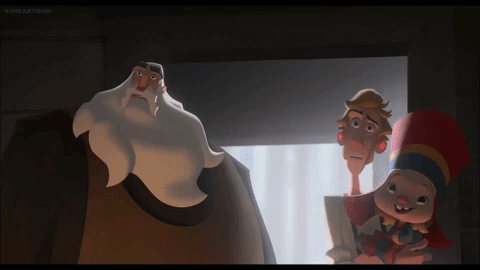
It’s almost Christmas time so I figure it would be the right time to talk about one of my favorite animated Christmas movies.
It’s the story of one postal worker named Jesper and how he participated in (or practically invented) the origins of the Santa Claus myth. Taking place sometime before the 20th century, Jesper was a young man who would rather coast through life living off his family’s wealth rather then partake in the family business. His father the Post Master General decided enough was enough and gave his son an ultimatum. Fulfill a large quota in a certain amount of time or be permanently cut-off financially. A task which proved challenging for Jesper as the mail route he was assigned to had a long history of neighbors battling on a daily basis which meant no one was interested in reaching out to one another even by mail. Just when things are looking hopeless for the guy, Jesper comes across a stray child’s drawing and a widower woodsman. The woodsman who is named Klaus saw the sadness in the child’s drawing and tasks Jesper with giving said child a toy he had made back from when he and his late wife were planning for children they were never able to have. Realizing he could work this to his advantage, Jesper convinced Klaus to keep giving away his old toys to the children so he could fulfill his quota and go back to his wealthy lifestyle. Overtime they both indirectly transform a desolate town into a warm community. Jesper started out as wanting to get back to a life of luxury but that begs a question. If he found the right people, does he want anything more?
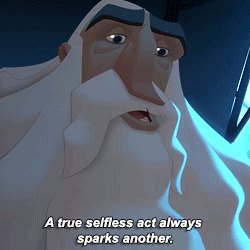
There have been a lot of Christmas movies and specials over the years. Animated ones, live action ones, and romantic ones where the lead learns the true meaning of Christmas from small towns where most times their love interests turn out to be royalty. But this particular recent creation stood out to me. It’s not very commercial, the color schemes are more subtle and it’s not particularly overt with religious tones that usually come with the holiday. It wasn’t so much as about Saving Christmas as it is with Saving a community with Christmas.
It’s particularly a down-to-earth kind of Christmas movie where it’s not very clear about the magic occurrences that goes on in particular scenes. It also gives credit to the postal service. Portraying it as the serious function to society as it’s meant to be. It also serves a bit of a humorous tongue-in-cheek wink to the instance of Santa Claus taking credit for the deliveries made by the put-upon postal worker. We also get representation for the Sammi people, which rarely happens even in live action works. Not to mention how they serve the plot and the contribution to the reindeer element of Christmas.
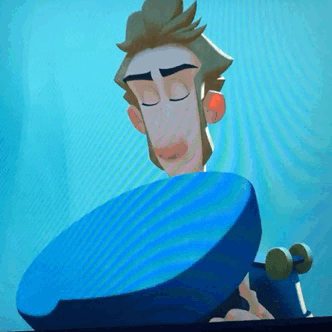
Overall this movie deserves love and praise for its themes of community and good deeds sparking a chain reaction of positive change. This deserves to be in the top ten list for Christmas movies to watch annually.
158 notes
·
View notes